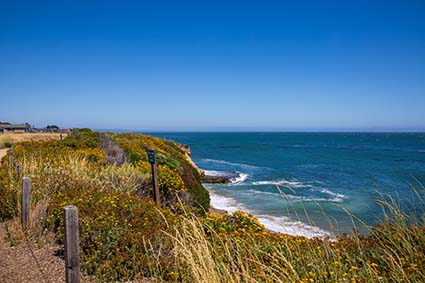Climate & Sustainability
Engineering faculty take on innovative climate resilience projects
Engineering professors are leading three major projects to address climate crisis issues with funding from UCSC’s newly launched Center for Coastal Climate Resilience.

From building more efficient greenhouses to improving wildfire management, Baskin Engineering professors are leading three major projects to address climate crisis issues with funding from UCSC’s newly launched Center for Coastal Climate Resilience.
The Center recently announced a total of more than $4.6 million in award funding for efforts to fight climate change in coastal communities across California and beyond. All three of the projects led by engineering faculty are pilot awards, meaning they were previously unfunded efforts to address climate impacts and solutions.
“We are very excited about these new initiatives as we continue to build capacity, expertise and partnerships,” said Anne Criss, Assistant Dean of the Baskin School of Engineering who is coordinating climate change-related projects at the school. “Engineering is here to provide meaningful contributions to improving our resilience to climate change, playing an essential role not only in finding technical solutions to reducing greenhouse gas emissions, but also in helping coastal communities adapt to our changing climate.”
Coastal Monitoring
Principal Investigator: Professor of Computer Science and Engineering Alex Pang
Co-Investigators: Associate Research Professor of Institute of Marine Sciences Borja Reguero
Collaborators: Professor of Environmental Studies and Director of the Coastal Science and Policy Program Anne Kapuscinski, Senior Scientist at NOAA Gregory Dusek, Research Geologist at USGS Jonathan Warrick, and David Gutierrez of Solutions and Services.
Sea level rise poses a great threat to coastal communities such as Santa Cruz, and a prerequisite for protecting those communities is a deep understanding of those threats and the risks they pose. This project will employ a machine learning-based algorithm to analyze changes in the Santa Cruz shoreline and nearshore dynamics such as rip currents using video from a network of webcams in the study area. The shoreline data captured at various time scales and rip current occurrence data can be used for climate modeling, prediction, and policy making, such as long-term studies on sea level rise and rip currents to help with beach safety. The software will be open source so it can be replicated for other settings and extended for future projects.
Greener Greenhouses
Principal Investigator: Professor of Computer Science and Engineering Katia Obraczka
Co-Investigators: Assistant Professor of Electrical and Computer Engineering Colleen Josephson, Professor of Environmental Studies Michael Loik, Assistant Professor of Electrical Engineering and Computer Science at UC Merced Wan Du
As extreme weather threatens agricultural production and about a third of the world’s population does not have access to adequate food, greenhouses are an important aspect of climate resilience in the global food production system. Katia Obraczka and her team will develop greenhouses equipped with an Internet of Things system that continuously monitors conditions such as airflow, temperature, humidity or light throughout the greenhouse to optimize resource usage such as water and fertilizer, while improving food production. The system will employ LiFi, a low-power wireless communication technology that uses light waves emitted by LEDs for ultra-low-power and efficient communication. LEDs will also be used to provide supplemental illumination for the plants as well as energy sources for the light-powered IoT sensing nodes. The LiFi IoT will also be used to control greenhouse elements such as vents, lights, and irrigation pumps. The LiFi-based IoT technology will be open source, making it accessible to small, local farmers. Ultimately, the team hopes to show that plants grow as well or better in greener greenhouses than current methods, while reducing the amount of water, electricity, and labor used to grow healthy food in addition to operating battery-free.
Firefighter Toolkits
Principal Investigator: Professor of Electrical and Computer Engineering Ricardo Sanfelice
Co-Investigators: Director of the CITRIS Initiative for Drone Research Becca Fenwick, Associate Professor of Mechanical Engineering at UC Berkeley Michael Gollner, Professor of Computational Media Katherine Ibister, Assistant Professor of Electrical and Computer Engineering Steve McGuire, Professor of Computer Science and Engineering Katia Obraczka, Professor of Civil and Environmental Engineering at UC Berkeley Raja Sengupta (UCB), Professor of Civil and Environmental Engineering at UC Berkeley Kenichi Soga, and co-founder and director of the Monterey Bay Drone, Automation and Robotics Technology initiative Chris Bley.
Extreme wildfires have increasingly plagued communities throughout the US and across the world, from Santa Cruz to Canada to the Australian outback. And though wildfires are a natural element of a healthy ecosystem, droughts, climate change, and the buildup of fuels have made them more severe. Ricardo Sanfelice and his team plan to take advantage of recent technological advances to create an innovative system for wildfire prevention, prediction, management, and suppression using aviation, communication, sensing, and decision-making technology. The system will provide ongoing information about environmental factors including wind speed and direction, potential actions, and patterns. It will also efficiently guide the deployment of firefighters, their vehicles and resources, and other assets. The goal is to have these systems be easily integrated into existing toolkits used by firefighters, and to provide training curriculum and policy recommendations for its implementation. In the pilot phase of this project, the researchers will focus on developing a suite of software, deploying aircrafts for data collection in high-risk areas of California, and beginning the creation of curriculum and policy.